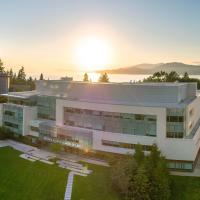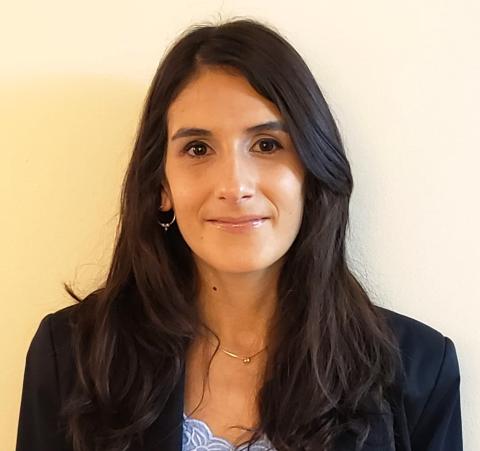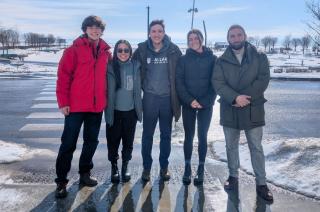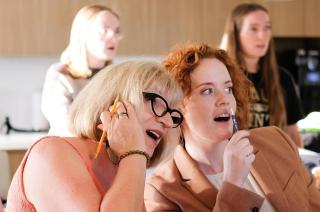'Domestic violence is a workplace issue,' says PhD student Sofia Cornejo

Allard Law
Jul 20, 2022

"We need to be thinking of domestic violence as a workplace issue," says Allard Law doctoral student Sofia Cornejo.
Sofia is researching the impact of domestic violence laws and policy on women in the workforce, hoping to better understand how domestic violence leave provisions can help strengthen women’s rights.
Sofia's interest in domestic violence law began while she was working as a court clerk at the labour rights court in Rio Cuarto, Argentina, after obtaining her Bachelor of Laws from the National University of Rio Cuarto. While working at the court, she learned about the discrimination and challenges women face in the workforce, which sparked her desire to better understand the role of law in producing, reproducing and redressing gender inequalities.
In 2019, she began her Master of Laws degree at Allard Law, where she conducted an analysis of parental leave regulations in Argentina and Canada. During that time, she worked as a research assistant, an experience that motivated her to continue into the PhD program at Allard Law, under the supervision of Professors Janine Benedet and Bethany Hastie.
In this interview, we chat with Sofia about her experience at Allard Law so far, her research and her strategies for making the most out of her time in law school.
What influenced you to pursue graduate studies at Allard Law?
One of the main reasons I choose to study at Allard Law was the international prestige of the law school and its faculty members. I also found that the work by some of the law school’s leading professors and at the Centre of Feminist Legal Studies aligned very well with my research and personal interests.
Another important factor that influenced my continuing into the PhD program was the feeling of belonging I had within the Allard Law community. During the LLM program, I found the law school to be a constructive and productive space to openly express my ideas, share my interests and develop my passion for legal research. By continuing with my studies here, I get to contribute to this community.
Can you share a bit about your doctoral research project?
My doctoral research explores the intersection between domestic violence and labour law by drawing on feminist perspectives. Over the last years, several countries and the International Labour Organization have recognized that domestic violence is a workplace issue and have implemented laws and policies — such as domestic violence leave legislation — to address this problem. In my research, I aim to shed light on the construction of domestic violence as a workplace issue and assess the effectiveness of domestic violence leave provisions in transforming gendered practices and stereotypes.
What excites me most about this project is the potential impact of my research on women's lives.
I ask why and how domestic violence is now recognized as a workplace issue and what the implications of this change are for women. I’m looking at each of the factors that have made this shift in the understanding of domestic violence possible. I’ll also be conducting a comparative analysis to explore the implementation of domestic violence leave legislation in different jurisdictions to assess how these laws have impacted women's experiences and transformed the workplace.
What are the possible real-world applications of your research?
The study of domestic violence as an issue in the world of work is an emerging area of study, so I expect to contribute to better understanding the impact of domestic violence leave legislation. What excites me most about this project is the potential impact of my research on women's lives. Hopefully, the results of my research will promote the adoption of effective workplace laws and policies that address domestic violence at work, and ultimately contribute to the expansion of women's rights.
My biggest goal is to raise awareness about the pervasive effects of domestic violence on women’s employment and to inspire future research and action directed towards addressing this pressing issue.
What strategies have you adopted to help you through graduate school?
Two main strategies have helped me navigate graduate school: organization and balance. Graduate school is very time demanding — being organized has been key. To avoid feeling overwhelmed, I set daily and weekly goals and break down my work into manageable tasks. Also, applying time management techniques has helped me make the most of my time. For example, I set timelines to accomplish tasks and use the Pomodoro technique to increase my productivity.
A second strategy that works for me is setting aside time for non-academic activities and connecting with friends and family. A PhD program takes several years, so finding work-life balance is crucial. I enjoy being outdoors, exercising and painting. Including breaks in my daily routine to do some of those activities helps me release stress and improve concentration.
You've volunteered with West Cost Leaf and the Migrant Workers Centre here in Vancouver. What inspired you to pursue these opportunities and what have you appreciated most about working with these groups?
I decided to volunteer because I wanted to contribute to the critical work that organizations like West Coast Leaf and Migrant Workers Centre are doing in Vancouver in advocating for social justice and substantive equality. What I enjoyed the most about volunteering was meeting the outstanding people who work in these organizations and learning from their invaluable work.
Doing volunteer work has also complemented and enhanced my research by allowing me to appreciate women's and migrant workers’ struggles and everyday experiences with the law. Volunteering is a rewarding experience that I definitely will continue doing in the future.
Do you have any advice for incoming graduate students in terms of balancing the demands of graduate school?
Keeping balance in grad school may be difficult, but it’s not impossible. My first tip is setting and following a routine, which will help you to accomplish your academic goals while having time for non-academic activities that you enjoy. Also, being consistent and working every day, rather than waiting until the last minute, will make a difference in the quality of your work and reduce your anxiety level.
I also recommend building a support network and actively participating in the Allard Law community. Doing research can feel like a lonely activity sometimes, so it’s important to find ways to socialize. Sharing your work, concerns and ideas with other students and faculty members can help you avoid feeling isolated.
UBC and Allard Law offer many workshops, lectures and social events that are great opportunities to meet other grad students. Take advantage of these resources and enjoy the journey!
- Allard School of Law
- Graduate Programs
- Research


